| Date: |
Event: |
|
| March 29-30 |
McClernand (XIII Corps)
begins moving down the west side of the river, to New Carthage. |
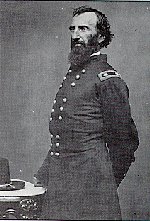
|
Maj. Gen. John McClernand
|
|
| April 16 |
First set of gunboats and transports runs
past the Vicksburg batteries. |
|
| April 17 |
Col. Benjamin Grierson sets out from
LaGrange, Tennessee, to raid the interior of Mississippi.
|

|
Col. Benjamin Grierson
|
|
| April 22 |
Second set of transports runs past the
batteries. |
|
| April 24 |
Grierson breaks railroad between Jackson
and Meridian at Newton Station. |
|
| April 29 |
Sherman
demonstrates north of Vicksburg.
Fleet
fails to reduce Grand Gulf.
|

|
Maj. Gen. W.T. Sherman
|
|
| April 30 |
Sherman continues his demonstration.
XIII (McClernand) and XVII Corps
(McPherson) begin crossing the Mississippi at Bruinsburg.
Sherman
ordered to join Grant.
|
|
| May 1 |
Battle of Port Gibson; McClernand and
McPherson defeat Brig. Gen. John Bowen.
Estimated casualties are: USA--861, CSA--767.
Grierson crosses the Amite River on his way to Baton Rouge.
|
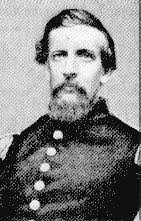
|
Brig. Gen. John Bowen
|
|
| May 2 |
Grierson's raiders reach safety at Baton Rouge, Louisiana. |
|
May 3
|
Confederates abandon Grand Gulf.
|
|
| May 5-7 |
McPherson feints north at Vicksburg from
Hankinson's Ferry on the Big Black River. |
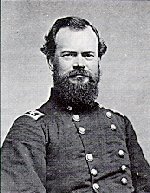
|
Maj. Gen. James B. McPherson
|
|
| May 8 |
XV Corps (Sherman) joins Grant.
Maj. Gen. Earl Van Dorn murdered by a jealous husband.
|
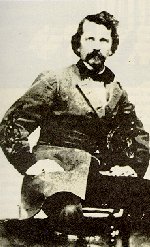
|
Maj. Gen. Earl Van Dorn
|
|
| May 9 |
Johnston ordered to go from
Tullahoma to Mississippi and take command in the field. |

|
Gen. Joseph E. Johnston
|
|
| May 12 |
Battle of Raymond; McPherson defeats Brig. Gen. John Gregg's force.
Estimated casualties are: USA--446, CSA--515. |

|
Brig. Gen. John Gregg
|
|
| May 13 |
Joe Johnston arrives at
Jackson to take command, wires Richmond, "I am too late." |
|
| May 14 |
Battle of Jackson; Sherman and McPherson
defeat Johnston and occupy the city.
Estimated casualties are: USA--300, CSA--845.
|
|
| May 16 |
Battle of Champion Hill. Grant defeats Pemberton's main body. Loring's division is separated
from Pemberton's army, eventually joins Johnston.
Estimated casualties are: USA--2,457, CSA--3,840.
|

|
Maj. Gen. William Loring
|
|
| May 17 |
Battle of Big Black River Bridge. Grant's troops (Lawler's brigade of XIII Corps) eliminate the Confederate rear guard.
Estimated casualties are: USA--273, CSA--1751, the vast majority of which are prisoners.
|
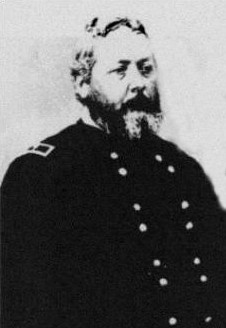
|
Brig. Gen. Michael Lawler
|
|
| May 18 |
Vicksburg (partially) invested; four
Confederate divisions (Stevenson, Bowen, Forney, and Smith) are
trapped inside the lines. |
|
| May 19 |
First assault.
Estimated casualties are: USA--942, CSA--70.
|
|
| May 22 |
Second assault.
Estimated casualties are: USA--3,199, CSA--500.
|
|
| June 3 |
Kimball's Provisional Division arrives. |
|
| June 6-7 |
Grant's Satartia trip. |
|
| June 7 |
Battle of Milliken's Bend;
Confederates under Maj. Gen. John G. Walker attack Grant's base on the west bank
of the Mississippi, and are repulsed. Although
the defensive force---mostly barely trained USCT, supported by an Iowa
regiment---are forced back to the levee, they fight valiantly and the
Rebels are driven off, with the help of naval gunfire from the ironclad
Choctaw.
Estimated casualties are: USA--652, CSA--185. There were reports that some of the USCT who were captured were subsequently executed.
|

|
Maj. Gen. John G. Walker
|
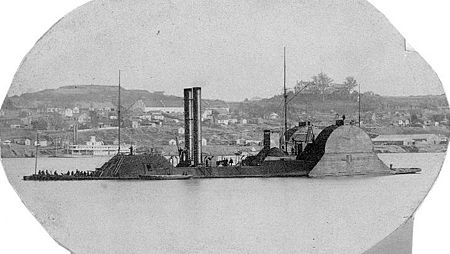
|
USS Choctaw
|
|
| June 11 |
Maj. Gen. F.J. Herron's division arrives from
Arkansas. |
|
| June 12 |
1/XVI (W.S. Smith) arrives. |
|
| June 14 |
Two divisions of IX Corps begin to arrive
from Kentucky. |
|
| June 18 |
McClernand relieved of command. |
|
| June 22 |
Sherman's expeditionary force formed to protect the rear of the Federal lines.
|
|
| June 25-28 |
Mine exploded under 3rd
Louisiana Redan; active combat rages for two days before the Federals
withdraw. |
|
| June 28 |
Anonymous soldiers warn Pemberton the
garrison is close to mutiny over rations. |
|
| July 1 |
Another mine exploded under 3rd Louisiana
Redan, but no follow-up attack is made.
Pemberton
asks his division commanders for their views of the situation.
|
|
| July 2 |
Capt. Comstock issues guidelines for
proposed July 6 assault. |
|
| July 3 |
Flag of truce appears
between the lines, and discussions begin between Grant and Pemberton as
to the surrender of the city and its garrison. |
|
| July 4 |
Pemberton surrenders the city and its
garrison to General Grant.
|

|
Maj. Gen. U.S. Grant
|
|
Casualties (est.):
USA: 4,910
CSA: 32,363 (29,495 were surrendered on July 4)
|












